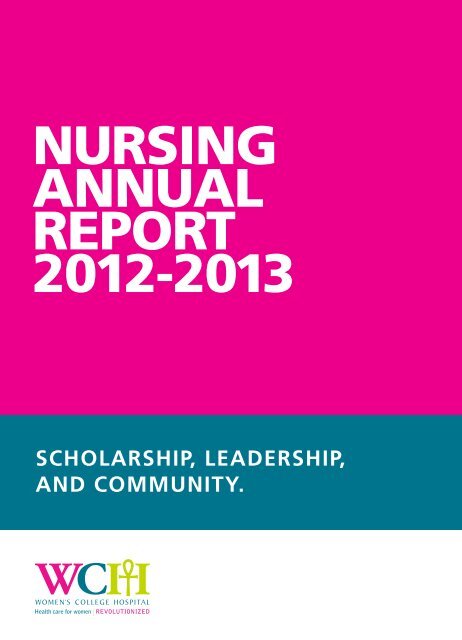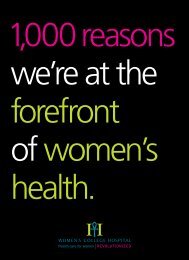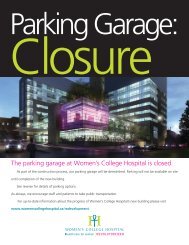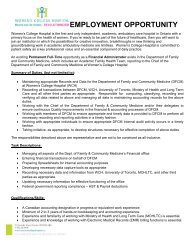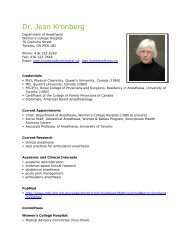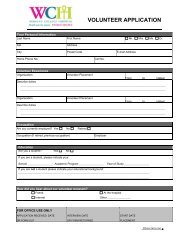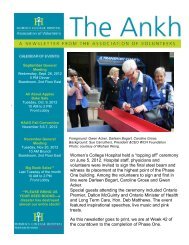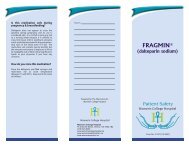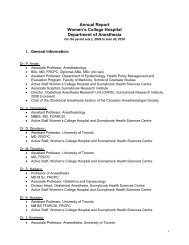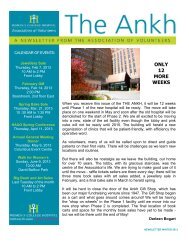NURSING ANNUAL REPORT 201242013 - Women's College Hospital
NURSING ANNUAL REPORT 201242013 - Women's College Hospital
NURSING ANNUAL REPORT 201242013 - Women's College Hospital
- No tags were found...
You also want an ePaper? Increase the reach of your titles
YUMPU automatically turns print PDFs into web optimized ePapers that Google loves.
NursingAnnualReport2012-2013Scholarship, Leadership,And Community.
“We will be seen asworld leaders inacademic womenfocusedambulatorynursing care. Nurseswill come here forunique learningopportunities.”– The Future Of Nursing At Women’s <strong>College</strong> <strong>Hospital</strong>
welcomeA Message from Jane Mosley,Chief Nursing Executive & Health Disciplines,Professional AffairsWelcome to Women’s <strong>College</strong> <strong>Hospital</strong>’s Nursing Annual Report.The theme of Nursing Week this year is “Nursing – A Leading Force forChange.” Well, 2012-2013 has been a building year – moving towardnew models of care delivery and a new building design, program andservice renewal, academic activity, education and research. This has been atremendous change journey…and there is more to come. Continue to leadyour patients and your colleagues as together we move into our collectivefutures. Nursing is a valued profession with dynamic leadership, innovatingeducation and research and a vibrant nursing community.Jane MosleyThis report is only a snapshot of our achievements. For the complete Nursing AnnualReport, visit: www.womenscollegehospital.ca/nursing/annualreport.pdf<strong>NURSING</strong> <strong>ANNUAL</strong> <strong>REPORT</strong> 2012 - 20133
WCH <strong>NURSING</strong> PLAN – 2013-2014KnowledgeCreate, discover,advance andtransform nursingknowledgeScholarshipNursing StudentsOffer advancedplacements inambulatory nursingand women’s healthEvidence-BasedPracticeIntegrate relevantresearch inambulatory nursingpractice and healthContinuingEducationSupport ongoingacquisition andrefinement of nursingknowledgeQUALITYOUTCOMESPerformance ManagementMeasure excellence, enactprofessional commitmentLEADErshipto quality, safety, continuousgrowth and lifelong learningCoaching &MentorshipRefine a strategicprocess to developand support nursingleadersLeadership CapacityEngage existingleadership resources,processesand structuresPatient SafetyActivate nurses’visibility as leadersin care quality andpatient safety withinthe organizationPatient InformationStandards & IntegritySupport patientcentred approachto careCommunityQuality AssessmentIdentify key performance indicators,measure nursing contributionsto patient, provider andorganizational outcomesStrong InternalRelationshipsEngage a vibrantWCH nursingCommunityRecruitment& RetentionInvest in agenerational nursinghuman resources planStrategic ExternalRelationshipsIdentify, prioritize anddevelop key externalrelationships4 WOMEN’S COLLEGE HOSPITAL
ScholarshipWCH has a New Nursing ScholarAs a recent nursing PhD graduate, Jennifer Price says her original goal was to bringmore attention to women’s cardiac disease. “It started with a question: 50% ofwomen have cardiac disease but only 25% access cardiac rehab. I wanted toknow why.”“As a professional nurse, I have learned both how to ask a question and how toanswer it. As nurses, we all have lots of questions but it’s not always easy to getsimple answers,” says Price.This led Price to years of study, culminating in her graduation from the doctoralJennifer Priceprogram in nursing at the University of Toronto. “Now I am part of the WCHnursing community in a new way, bringing these research skills to my fellow nurses. I am one of thelucky nurses who got to ask my questions and learn the skills to find the answers.”Price plans to continue to research women’s heart health and inform best practices in nursing.“That’s the beauty of Nursing – we get to take the evidence and research and translate it for ourpatients so they can use it. When we help women become better self-managers, their healthimproves as does their family’s, and ultimately, their communities’,” she says.Innovative Treatment in Women’s Mental HealthProgramThe Women’s Mental Health program’s mandate to educate the next generationof clinicians has Pat Woods as its champion. Working as a nurse for over 14 years,Woods recently completed an 18-month certification program in Sensori-MotorPsychotherapy (SP). This marks the third and final phase of the SP Training process,which Woods began in 1999. This innovative program uses mindfulness and bodyreflection to unlock trauma in the body.“Completing this certification program has direct impact on our clients. Learningthe theory, practice, and research will help me better pace my treatmentinterventions and create safer spaces for our clients. The link between trauma andthe body is profound and I want to better enable my patients to improve self-care,”Pat Woodssaid Woods.Since beginning this program, Woods has shared her new learnings throughpresentations to the rest of the mental health team and to students. She also participated in a WCHpre-pilot research project to evaluate this treatment in a group therapy setting. “This study hasdeepened my sense of engagement, reconnected me to my work, and provided me with new toolsand a desire to revitalize my patient interactions,” says Woods.<strong>NURSING</strong> <strong>ANNUAL</strong> <strong>REPORT</strong> 2012 - 20135
ScholarshipJudie SurridgeWomen’s <strong>College</strong> Family Practice Nurse Paved Wayfor Revolutionary ProgramUntil recently, family practice nursing lacked the formal education and clearlydefined role necessary to make it a recognizable nursing specialty. Fortunately, a newprogram at George Brown <strong>College</strong>, championed in part by Judie Surridge, Women’s<strong>College</strong> <strong>Hospital</strong> RN and president of the Ontario Family Practice Nurses (OFPN), is onits way to changing all that.Surridge was appointed chair of the program’s advisory committee and given jointresponsibility for ensuring that the program’s structure and curriculum reflect theknowledge and skills that are used in a family practice setting, but are missingfrom current nursing programs. “The result has been truly groundbreaking andrevolutionary for the nursing field as a whole,” says Surridge.Transitioning from Pediatric to Adult Care:Improving Health Research on Young AdultsA significant number of Women’s <strong>College</strong> <strong>Hospital</strong> (WCH) patients are betweenthe ages of 18 and 25. That’s why it is important to recognize the unique needs ofyoung adults as they transition from pediatric to adolescent care.Jacqueline Follis, RN, MSN, CDE advanced practice nurse, WCH, is doing justthat. She recently completed a clinical fellowship as part of the Registered Nurses’Association of Ontario’s (RNAO) best practice guidelines. Her work focused on thetransitioning of young adults with chronic health conditions.“The fellowship involved assessing current care practices for young adults withJacqueline Follis chronic conditions coming from the pediatric health care system,” says Follis.The research will offer improved care to patients and their families, and will lead toenhanced clinical knowledge, better skills and greater overall nurse confidence.“I hope that through my research I will be able to increase awareness so that health-care providersmight adjust their behaviours to better address the needs of this age cohort. This improved behaviourwill lead to better patient satisfaction and greater connection to the ambulatory care model.Young adults will remain connected to the health-care system and participate in the chronic caremanagement and potentially experience fewer long-term complications,” adds Follis.6 WOMEN’S COLLEGE HOSPITAL
LEADERSHIPNurses Leading Nurses Through NursingPreceptor NetworkEighteen WCH staff nurses collaborate and support each other as Preceptors forundergraduate nursing students from University of Toronto and Ryerson University.Co-ordinated by Andrea Messner (Surgical Day Care), each Preceptor has developeda profile of the experience offered in their area/department. The profile defines thepatient population within the area, potential for shadowing in other areas and crossdepartmentalor associated off-site opportunities and resources available.The Preceptors meet every second month with a guest speaker presentation and around table discussion to exchange ideas and share both successes and challenges.Many nurses report that having a student in their area enriches and refreshesAndrea Messnerpractice for them and allows them to share their expertise with the students – alltowards delivery of high-quality patient care!Student feedback has been overwhelmingly positive. Many students express their appreciation ofthe mentorship provided by the Preceptors, the breadth of experience possible within the PreceptorNetwork and the warm welcome they receive.Continually Evolving - A Nurse’s Career JourneyVal Lawler was first hired as a nurse at Women’s <strong>College</strong> <strong>Hospital</strong> (WCH) in 1987.With some time off between then and now for travel and motherhood, she hasexperienced multiple roles across the organization. Motivated by both opportunityand interest, Lawler has found a niche in clinical leadership.Working as an APN in the Centre for Headache for the last three and a halfyears, Lawler is motivated by the hospital’s vision and potential as an AmbulatoryAcademic Centre of Excellence. “This job has taken me in directions I had neverdreamed of. My interest in women’s health has been a constant theme,”says Lawler.Val LawlerIn the Headache Clinic, Lawler finds energy in the learning and mentoring from anexpert as she continues to move from novice to expert. “The work is very satisfyingas I get to improve patients’ health in a measurable way. It’s satisfying to see patients experience painrelief,” she says.Work in the Headache Clinic involves individual and group patient education. Sharing these learnings ispart of the journey, through poster presentations and research activities.“This is a place to keep learning as we evolve women’s health in an academic, ambulatory environment.The learning renews my passion for patient care, and my career as a nurse.”<strong>NURSING</strong> <strong>ANNUAL</strong> <strong>REPORT</strong> 2012 - 20137
LeadershipSheila Macdonald Honoured withPrestigious AwardFor her tireless dedication in developing and expanding sexual assaultand domestic violence programs on a provincial and national level,Sheila Macdonald was awarded the highest honour by the InternationalAssociation of Forensic Nurses (IAFN) earlier this month. The Virginia A.Lynch Pioneer Award is presented annually to an individual who has madean outstanding contribution to the field of forensic nursing. Virginia Lynch,founder of Forensic Nursing, presented Macdonald with the award.Macdonald is the provincial co-ordinator for the Ontario Network of SexualSheila Macdonald (left) Assault/Domestic Violence Treatment Centres and clinical manager forand Virgina Lynchthe Sexual Assault/Domestic Violence Care Centre (SADVCC) at Women’s<strong>College</strong> <strong>Hospital</strong> (WCH). She participates in numerous projects includingresearch on the unconscious patient, drug-facilitated sexual assault and the use of photography insexual violence.“To be recognized by peers in my field is such an honour. I hold all of them in such high regard,” saidMacdonald. “This acknowledgment is something that I value so much.”Falls Prevention – Making a Difference“Every nurse at WCH has the opportunity to make a difference in a patient’s life.Find an interest and pursue it.” This philosophy of Carolyn Franke’s has fueled herinterest as a Family Practice Nurse with a special focus in Falls Prevention.Franke is making a difference in several ways: she serves as co-chair of the WCHFalls Council, and is focused on a Leading Practice Falls Project with Family Practice.“While preparing for Accreditation 2010, we wanted to look at risks from falls forour ambulatory patients as we are fortunate to have a longitudinal relationship withso many of them,” says Franke.The project had 2 key goals: 1) to increase the rate of screening for patients 65Carolyn Franke years and older; and 2) to provide clinicians with resources and education to bettereducate those patients at risk.“Reviewing large numbers of patient charts is possible with electronic health recordsand we have seen great improvements. Over 6 months, the number of patients screened has doubled,”she says. The project continues and has already led to several measurable improvements.“It’s great to be a Family Practice Nurse. I get the opportunity to help someone live a long and healthylife on their own terms. And I am honoured to represent my colleagues and their accomplishments onthe Falls Council,” adds Franke.8 WOMEN’S COLLEGE HOSPITAL
LEADERSHIPNursing Advisory Council Selects New Co-ChairWith 18 years of experience as a dedicated nurse in the specialized medicineand dermatology program, Sandra Walsh has first-hand insights into how nursesprovide leadership both on the front line through patient care delivery and on abroad scale within the organization.These insights, along with her passion for moving nursing practice forward,are why she recently became the new co-chair of the Nursing Advisory Council(NAC) alongside Jane Mosley, chief nursing executive, health disciplines andprofessional affairs.“This is a wonderful opportunity for me to practise in a leadership role, inspireothers, and develop skills that can be transferred to clinical practice. I am verySandra Walshgrateful for the mentoring I received over the past five years,” says Walsh.Judie Surridge, who previously co-chaired NAC, remains on the council as the chair of thescholarship sub-committee. She provided supportive and wise leadership for NAC over the pastthree years, and the council acknowledged this through a presentation to her this past fall.NAC, a governing body, represents all nurses at WCH. Nursing plays a vital role in achieving WCH’svision to revolutionize the health care of women and remain a leader in ambulatory care.“As part of the NAC, I hope to create an environment for all nurses at Women’s <strong>College</strong> <strong>Hospital</strong>to enhance their careers by increasing the visibility and importance of nursing within the hospitalto support our patients,” adds Walsh.Walsh’s commitment to advancing the nursing profession at WCH and her enthusiasm fordelivering superior patient care are qualities that are sure to be valued in her new role as the cochairof the NAC.<strong>NURSING</strong> <strong>ANNUAL</strong> <strong>REPORT</strong> 2012 - 20139
CommunitySpotlight on Nurse Practitioner Roleat WCH Crossroads Clinic“I have the best NP job in the city,” says Vanessa Wright, who was hired 18 monthsago in the WCH Crossroads Clinic, Toronto’s first hospital-based refugee clinic.To help make the transition easier for newly-arrived refugees, the clinic aims toprovide comprehensive primary care that is responsive to the unique and unmetneeds of refugees during their first two years in Canada.“I am a curious person with a lot to learn from my patients and my colleagues.Working with patients from around the world is a gift that keeps me open to newexperiences, and constant challenges. I have the opportunity to look at best practicesVanessa Wright and adapt them across cultures,” says Wright.Working with students and other NPs allows Wright to energize others in areas ofNursing Leadership and advocacy for refugee populations, and international health.“As a new NP, I am lucky to pave the way. I greatly value the mentoring and support I have receivedhere at WCH.” Wright will soon be starting a new Nurse Practitioner-led clinic for refugees at a localshelter, adapting clinical work into the community.Learning in the AACUThe Nurses in the Acute Ambulatory Care Unit (AACU) adaptand grow with Women’s <strong>College</strong> <strong>Hospital</strong>’s evolving caremodel. WCH is dedicated to developing health-care solutionsthat deliver the best quality and safest care for our patientswhile creating new models of ambulatory care that willimprove Ontario’s health-care system as a whole. As such,we have identified a need to phase out our role in acceptingwalk-in patients in our Urgent Care Centre (UCC) and changeit into an expanded AACU.The Nurses in the AACU continue to adapt and expand theirNurses in AACU unit meetingnursing expertise to provide excellent patient care sevendays a week, 24 hours a day. They play a key role in the care of patients in the Specialized MedicineProgram who require timely ambulatory care assessment and interventions. Their work supports TorontoCommunity Care Access Centre (CCAC) and patient-centred care at WCH and advances partnershipswith community primary care physicians.The expanding diversity of programs within Specialized Medicine and the acute ambulatory needs ofpatients results in new challenges. The AACU Nurses identified a need to increase and deepen theirassessment process and evaluation skills related to their patient population. A series of case studiesare now presented for critical analysis and discussion with input from Nursing, Pharmacy and HealthDisciplines Staff. The same topic is presented twice weekly to allow for all staff to participate.1 0WOMEN’S COLLEGE HOSPITAL
CommunityThe Bay Centre for Birth Control – EmpoweringWomen through KnowledgeKristen Cocchetto has experienced multiple leadership opportunties since coming tothe Bay Centre for Birth Control (BCBC) in 2008.“Leading the Colposcopy Clinic for two years was a great experience. The Bay Centrehas a unique model aimed at increasing the number of women who followup afteran abnormal pap smear.”Over the past year, Cocchetto had the opportunity to share the Women’s <strong>College</strong> Kristen Cocchettoexperience, speaking and co-presenting at several symposiums.Currently enrolled in a master’s program, Cocchetto is en route to becoming a nurse practitioner in primarycare. “Sexual Health knowledge is constantly changing and I want to keep up to date on the research andpractice. A huge part of my job is patient education. I want to help women better understand their bodies– this in turn empowers and engages them in better self-care. Better self-care leads to improved and saferpatient outcomes. Learning more about women’s health keeps my engagement high, and allows me to be abetter support for patients’ experiences, which can be frightening or emotional,” she says.“The leadership and educational opportunities make me more confident, and more passionate about theservices we provide. I feel honoured that I get to touch patients’ lives and be a partner in their health-care.”Surgical Nursing Initiative Improves the Patient ExperienceThree Surgical Program Nurses completed Late Career Nurse Initiative (LCNI)projects this past year. The targets of their work were improving patientjourneys and enhancing patient and staff safety.LCNI projects are funded by the Ministry of Health and Long Term Care.Theinitiative is intended to support retention of Late Career Nurses and providean organization with the opportunity to benefit from their expertise. Fundingis provided to backfill staffing of 0.2 full time equivalent for 16 weeks. Thenurses are freed up from their regular work to apply their expertise to a bodyof work identified as necessary to the program or organization.Mira Selimovic (left),Cathy Matthews andCarla Robarts (not shown)Mira Selimovic (Operating Room) built on foundational infection preventionand control work to update and revise the environmental cleaning processesand procedures in the Operating Rooms in advance of the move to our new facility in May 2013. Improvedenvironmental cleaning practices in our new OR space will support improved patient and staff safety.Cathy Matthews (Operating Room) focused her work on improving the patient journey in the Women’sSurgical Procedures program. Working with Nurses from Bay Centre for Birth Control, Surgical Day Care,Operating Room and Post Anaesthetic Care Unit (PACU) as well as Surgeons and Anesthetists, Matthews ledwork to streamline the flow of patients and increase staff effectiveness.Carla Robarts (Post Anesthetic Care Unit) worked with the nurses of Surgical Day Care and PACU to improvethe timely transfer and discharge of patients in the post–operative recovery period. Lessons learned from herwork will support and inform new ways of caring for the post-operative patient safely and effectively in thereconfigured recovery area of our new building.<strong>NURSING</strong> <strong>ANNUAL</strong> <strong>REPORT</strong> 2012 - 201311 11
KEY INITIATIVES 2012-2013Rnao Best Practice Spotlight OrganizationWCH Nursing has been granted funding for three years under the Registered Nurses Associationof Ontario (RNAO) Best Practice Spotlight Organization (BPSO) initiative. Health care and academicorganizations are selected as BPSOs to implement and evaluate the RNAO’s best practice guidelines.It is a dynamic partnership that focuses on making a positive impact on patient care though evidencebasedpractice.In alignment with nursing best practice and excellence in patient care, WCH is implementing fivebest practice guidelines that promote our commitment to scholarship and excellence in patient carethrough evidence-based best practice.Five sets of Best Practice Guidelines (BPGs) are being implemented over the next three years, in astaged process.2012 – 2013 Organizational BPGs1) Preventing Falls & Fall Injuries2) Establishing Therapeutic Relationships2013 – 2014 Program Specific BPGs3) Assessment & Management of Pain4) Subcutaneous Administration of Insulin5) Strategies to Support Self-Management in Chronic Conditions.The BPSO Steering Committee and Councils with membership representing all programs anddepartments have been struck for each of the 2012-2013 initiatives. Goals and timelines have beenset for the first two initiatives. Baseline metrics are being collected and outcome indicators are underdevelopment.The work of the Steering Committee and Councils is targeted to facilitate success and staffengagement during a dynamic time of preparation for the May 2013 Phase 1 facility move and thesubsequent Accreditation Canada survey scheduled for December 2013. The Councils are committedto building ambulatory care expertise, promoting interprofessional collaborative best practiceenvironments, and sharing lessons learned.Nursing Student EducationWCH has a long and rich history of educating the next generation of nurses. Over 50 nursing studentshave made their way through our halls over the past year.The Toronto Academic Health Science Network Education Committee (TAHSN) has selected LearnerEngagement as a metric of Learning Excellence that it could report on as a collective, as there isevidence that Learner Engagement is a strong predictor of learner success. A standardized LearnerEngagement Survey was created to enable the collection and reporting of Learner engagement acrossTAHSN. Nursing is a key group being surveyed. We are looking forward to seeing how our ambulatorylearning experiences are being perceived by our learners. Feedback so far has been great!1 2WOMEN’S COLLEGE HOSPITAL
Ambulatory Care Nursing Journal ClubThe WCH Ambulatory Care Nursing Journal Club arose out of the creation of the Nursing Strategic Plan.Since 2010, WCH Nurses have been meeting monthly to share knowledge and promote research andcritical review through the Ambulatory Care Nursing Journal Club. This forum, dedicated to analysisand discussion is lead by Shelley Bouchard, Valerie Lawler and Sandra Walsh. The club meets to reviewnursing journal articles specifically related to ambulatory care nursing.Our nursing journal club is an excellent way to keep current with new practices and clinical updates. Itprovides nurses the opportunity to build scholarship, leadership and community into their professionalwork lives. Some of the many advantages of participating in our journal club include: keeping abreast ofnew nursing knowledge, promoting awareness of current nursing research findings, learning to critiqueand appraise research, becoming familiar with the best current clinical research and practice, andencouraging the use of research in practice.New this year Graduate Nursing students with their advanced practice nurse preceptors presentedarticles on key clinical challenges. Nursing leaders also presented current research findings andfacilitated dialogue on critical appraisal techniques.CareWCH continues to support Internationally Educated Nurses (IEN) for observational job shadowingplacements in collaboration with the Centre for Internationally Educated Nurses (CARE) organization.These placements offer IENs an invaluable opportunity to observe first-hand what day-to-day nursing islike in Ontario. The goal of job shadowing is to increase the participants understanding of the role andscope of practice of a nurse in a particular health care setting and better acquaint them with workplacelanguage and culture.Women’s <strong>College</strong> <strong>Hospital</strong> is pleased to accept up to 12 internationally-educated nurses per year.CARE has provided orientation for the WCH expert nurses. Expert nurses participating include AndreaMessner, Amelita Ortiz-Laureta, Leah Drazek, Ina Radziunas, Nicola Donovan, Fran Stewart and PJ Cruz.“I had observed procedures which I didn’t encounter in my previous exposure. It was a great experienceand my expert nurse was very kind and so are the staff,” said one of our CARE nurses.“There is so much value for us to work with nurses educated elsewhere. We can help nurses transitioninto our system while simultaneously learning about health-care practices abroad,” says Jane Mosley,chief nursing executive, health disciplines and professional affairs. “In Toronto, we serve a diversecommunity and it’s important that we learn from, and work with, those very same communities,cultures and backgrounds.”<strong>NURSING</strong> <strong>ANNUAL</strong> <strong>REPORT</strong> 2012 - 201313
KEY INITIATIVES 2012-2013Rising StarsAt Women’s <strong>College</strong> <strong>Hospital</strong> (WCH) helping staff reach their full potential to foster growth,expand their academic knowledge, leadership skills and professional development is a priority.That’s why for the third time now WCH partnered with Saint Elizabeth Health Care and TorontoPublic Health to bring the Rising Stars program to our staff, and to educate and encourage themto be future leaders.The program is open to health-care sector workers from a range of disciplines. It runs fromSeptember to June and involves 27 students, seven of whom are from WCH. A number of theparticipants are nurses, including two nurses from WCH: Leah Drazek and Andrea Messner.Over the course of the program, students participate in approximately 15 various developmentsessions and experience formal and informal learning, as well as a mentorship component toencourage growth, leadership skills and professionalism.Participants from all organizations met at WCH on Feb.27 to be congratulated by their mentorsand honoured with a rising stars pin at a special pinning ceremony. At the event, senior leadersincluding Heather McPherson, vice-president of patient care and ambulatory innovation, and JaneMosley, chief nursing executive, health disciplines and professional affairs, held a panel discussion,sharing their own personal journeys in becoming leaders in their field, and inspiring those in theprogram to do the same.“The Rising Stars program has provided me the fundamental basis to build on my leadershipskills, attributes and potential. The curriculum delivered by leading experts laid the foundationfor emerging into an effectively great leader,” says one of this year’s Rising Stars, Leah Drazek,advanced practice nurse, Integrated Diabetes.Late Career Nursing InitiativeThe Late Career Nursing Initiative is funded by the Ministry of Health and Long Term Care. Thisprogram supports nurses participating in important projects to improve patient care. This year,three nurses from the surgical program participated in the initiative.Nursing Grand RoundsNursing Grand Rounds is a monthly educational offering which highlights key nursing practiceand leadership challenges and opportunities. Presenters are members of WCH community aswell as key partners from our community. These rounds support fulfilling on our goals relatedto scholarship, leadership and community. See the monthly list of presenters and topics in thecomplete Nursing Annual report.This report is only a snapshot of our achievements. For the complete Nursing AnnualReport, visit: www.womenscollegehospital.ca/nursing/annualreport.pdf1 4WOMEN’S COLLEGE HOSPITAL
The HOSPITAL OF THE FuTurEOur state-of-the-art facility coming in 2015.<strong>NURSING</strong> <strong>ANNUAL</strong> <strong>REPORT</strong> 2012 - 201315
Nursing Annual Report 2012-2013


